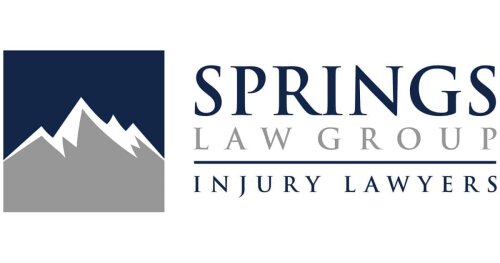Best Brain Injury Lawyers in Colorado
Share your needs with us, get contacted by law firms.
Free. Takes 2 min.
Or refine your search by selecting a city:
List of the best lawyers in Colorado, United States

About Brain Injury Law in Colorado, United States
A brain injury can be a life-changing event, affecting not only the injured person but their family and support network as well. In Colorado, brain injury law focuses on legal claims arising when a person suffers a traumatic brain injury (TBI) or acquired brain injury due to another party's negligence, recklessness, or intentional act. These claims are typically handled as personal injury cases, including situations such as car crashes, slips and falls, workplace accidents, medical malpractice, and assaults. The law is designed to help victims receive compensation for medical bills, lost wages, pain and suffering, and other losses associated with their injury.
Why You May Need a Lawyer
After a brain injury, people often face complex legal and financial issues. You may need a lawyer in the following situations:
- The insurance company denies your claim or offers a settlement that is too low
- The circumstances of the injury are disputed or unclear
- The responsible party denies liability or blames you for the accident
- You are unsure how much compensation you are entitled to receive
- Medical bills and other expenses are mounting, and you are unable to work
- Long-term or permanent disability may result from the injury
- You need help gathering evidence, expert testimonies, and documentation to support your claim
Local Laws Overview
In Colorado, several key legal aspects are important for brain injury cases:
- Statute of Limitations: Generally, you have two years from the date of the injury to file a personal injury lawsuit, but for motor vehicle accidents, this period is extended to three years.
- Comparative Negligence: Colorado uses a modified comparative negligence system. You can recover damages even if you are partially at fault, as long as you are less than 50 percent responsible. However, your compensation will be reduced by your percentage of fault.
- Caps on Damages: Colorado law sets limits on certain types of damages, such as noneconomic damages (pain and suffering), with higher limits for cases involving permanent physical impairment or disfigurement.
- Mandatory Reporting: Certain injuries, especially those resulting from suspected abuse, must be reported to authorities under Colorado law.
- Insurance Requirements: Colorado requires all drivers to carry minimum liability insurance. This can be crucial in car accident cases leading to brain injuries.
Frequently Asked Questions
What should I do right after a brain injury occurs?
Seek medical attention immediately, even if the injury seems minor. Document everything related to the incident, and avoid speaking with insurance adjusters or signing any documents before consulting a lawyer.
How do I know if my brain injury is legally actionable?
Your injury may be actionable if it was caused by someone else's negligent or intentional actions. A lawyer can evaluate your case and help determine if you have legal grounds for a claim.
How long do I have to file a lawsuit for a brain injury in Colorado?
For most personal injury claims, you have two years from the date of injury, and three years for car accident cases. Failing to file in this time frame may prevent you from recovering compensation.
What types of compensation can I recover in a brain injury case?
You may be eligible for compensation covering medical expenses, lost wages, future medical care, pain and suffering, loss of consortium, and other damages related to your injury.
Will I have to go to court?
Many brain injury claims are settled out of court. However, if a fair agreement cannot be reached, your case may proceed to trial.
How is fault determined in Colorado brain injury cases?
Colorado follows comparative negligence laws. Fault is determined based on evidence, witness statements, expert opinions, and more. Your compensation may be reduced if you are found partially at fault.
What if the at-fault party does not have enough insurance?
You may be able to make a claim against your own uninsured or underinsured motorist coverage. An attorney can help you explore all available sources of compensation.
Can I file a claim if I was injured at work?
Workplace brain injuries are usually handled through workers' compensation, but third-party claims might be possible in some situations. A lawyer can help you understand your options.
How much does it cost to hire a brain injury lawyer in Colorado?
Most personal injury lawyers work on a contingency fee basis, meaning you only pay if you recover compensation. Fees are typically a percentage of your settlement or verdict.
What evidence is important in a brain injury case?
Key evidence includes medical records, accident reports, witness statements, photos or videos, expert evaluations, and documentation of lost wages or other impacts.
Additional Resources
If you need more information or help, consider reaching out to the following organizations:
- Colorado Bar Association - Find local attorneys and legal resources
- Colorado Department of Public Health and Environment - Offers information on TBI and rehabilitation services
- Brain Injury Alliance of Colorado - Provides support, advocacy, and resources for people affected by brain injury
- Colorado Legal Services - Assistance for those with limited income
- National Institute of Neurological Disorders and Stroke (NINDS) - Educational resources about brain injury
Next Steps
If you or a loved one has suffered a brain injury in Colorado, consider the following steps:
- Seek immediate medical care and follow all treatment recommendations
- Document all details related to the injury and its effects on your life
- Avoid discussing the case with insurance companies or accepting settlements before speaking with a lawyer
- Contact a qualified Colorado brain injury attorney to review your case and guide you through the legal process
- Take advantage of local support groups and advocacy organizations to help with recovery and adjustment
Lawzana helps you find the best lawyers and law firms in Colorado through a curated and pre-screened list of qualified legal professionals. Our platform offers rankings and detailed profiles of attorneys and law firms, allowing you to compare based on practice areas, including Brain Injury, experience, and client feedback.
Each profile includes a description of the firm's areas of practice, client reviews, team members and partners, year of establishment, spoken languages, office locations, contact information, social media presence, and any published articles or resources. Most firms on our platform speak English and are experienced in both local and international legal matters.
Get a quote from top-rated law firms in Colorado, United States — quickly, securely, and without unnecessary hassle.
Disclaimer:
The information provided on this page is for general informational purposes only and does not constitute legal advice. While we strive to ensure the accuracy and relevance of the content, legal information may change over time, and interpretations of the law can vary. You should always consult with a qualified legal professional for advice specific to your situation.
We disclaim all liability for actions taken or not taken based on the content of this page. If you believe any information is incorrect or outdated, please contact us, and we will review and update it where appropriate.
Browse brain injury law firms by city in Colorado
Refine your search by selecting a city.










